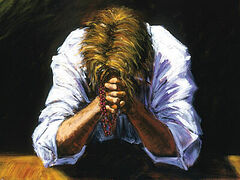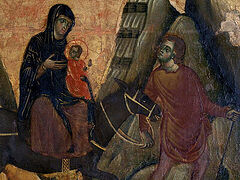Our spiritual state is rarely even, calm, and serene for any long period of time. Circumstances, thoughts, even the weather—all of this can easily darken the soul or, conversely, unexpectedly gladden it. How can we lead a spiritual life when man is so volatile? Metropolitan Athanasios of Limassol of the Orthodox Church of Cyprus spoke about this at a meeting with young people.
All the thoughts that affect the state of the soul come either from God (good changes), or from the devil (bad changes), or from a man himself (both good and bad). We know the good thoughts by their fruits. If we become more humble, more prayerful, meeker, more patient, warmer, nobler, more sensitive, this is the result of a good thought. But what should we do if not all of our changes are good?
A bad thought prevents us from thinking logically
 Saul Tries to Kill David With His Spear, Guercino, 17th C.
Saul Tries to Kill David With His Spear, Guercino, 17th C.
A man himself also influences his spiritual world, producing good or bad thoughts depending on whether his internal “mechanism” is attuned correctly or not.
I’ll give you an example from the Gospels. When the harlot came into the house and anointed Christ’s feet with myrrh, many of the Disciples were indignant, especially Judas, who was a lover of money. He began to say: “Why is this woman wasting such expensive myrrh in vain to anoint the feet of Christ?” The bad thought was that she was wasting the myrrh. But further on in the Gospel it says that he wasn’t concerned for the poor, but was simply avaricious and wanted to get money for this myrrh, put it in the money bag, and then use it for his own purposes.
People often ask me why we have so much luxury in the Church? But show me what we have that’s luxurious? If you want, cut yourself a piece of a candle stand and take it home, sell it, and get the money. Can’t you see that it’s bronze? You see, a bad thought doesn’t even let a man think logically.
Or someone gives alms. He gives five euros and starts thinking: “Maybe it’s not necessary? What’s five euros? Will a beggar get rich from this? It’s probably a scam.” Perhaps that’s so, but he immediately turns on a bad thought that inclines the soul towards evil, making it stubborn and opposed to grace.
It happens that bad thoughts come from demons. However, there are also purely physiological changes. You think differently in the morning, day, evening, and after midnight; differently in the dark and in the light; when it’s a dreary day, when the south wind blows, or when it’s sunny. Many note that people are in a better mood on sunny days, and when you’re around happy and grateful people, you rejoice with them.
What to do if the soul is clouded?
 The Flight of Lot from Sodom, Raphael
The Flight of Lot from Sodom, Raphael
Why did the Holy Fathers study all of this? To know when there’s a true spiritual battle going on, and when it’s possible to ignore internal changes. They tell us one main thing: We have to learn how to manage what happens to us.
If my soul is clouded, it’s important not to allow myself to become downcast, not to start talking harshly, offensively, and nervously, or to turn away and not accept another person.
Whatever changes occur in our soul, we must maintain the routine of the spiritual life and be even in our communication with other people.
Man is created according to the image of God, “very good,” and called to become like our Father. And the rest of what happens to us—bad behavior, nerves, words, nastiness—they aren’t our true self.
What does it take to change for the better?
It’s important to learn to behave in such a way as to not hurt other people, not to speak out disparagingly, not to be lazy, to maintain your way of life, no matter what happens. Precision in fulfilling our prayer rule helps with this.
Let’s not say on Sunday morning: “I’m not in the mood for some reason. I’m not going to church today.” Go, whether you’re in the mood or not. Even if our mind starts reasoning: “Where are you going? You’re just going to fall asleep there. You’re full of thoughts, bad thoughts inside of yourself. Don’t go!”—we shouldn’t step back and change our rule because of a change in our disposition.
How to deal with bad thoughts, and should we scold ourselves for them?
 The Good Samaritan, Ivan Surikov, 1874
The Good Samaritan, Ivan Surikov, 1874
It’s better to immediately cut off bad thoughts and not engage with them. It’s like a bag of trash: It’s better to throw it out right away so you don’t get soiled.
As for the question of whether we need to reproach ourselves for bad thoughts—we need discernment. If you can endure it, then good—the Holy Fathers did it. But for the young, it’s better to maintain yourself in love and gratitude. And we need good discernment, a good spiritual father, otherwise it’s easy to fall into despair.
If we’re oversensitive and we condemn and berate ourselves, then we can start to despond or despair. Since in our time we can easily despair, it’s better not to bring ourselves to this.
The gift of tearful repentance, which the saints had, comes from spiritual labor, not from self-reproach. Tears of repentance are the first stage—then they become tears of love!
Spiritual work and self-reproach are important, but it’s the healthy man who can do it. But if a man is spiritually and mentally weak, has a weak nervous system, then he won’t be able to stand it—he’ll become despondent and hopeless.
Therefore, Christ told St. Silouan: “Keep your mind in hell and despair not!”





